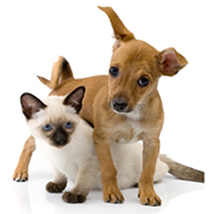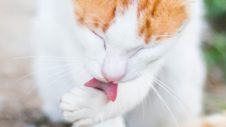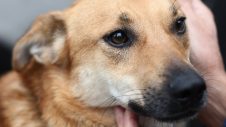
What is hookworm?
There are two species of hookworm that affect dogs and cats in Australia: Ancylostoma and Uncinaria. Adult worms are approximately 16 mm long and very thin. They live attached to the intestines of dogs, cats, and people. In reasonable numbers, they can cause illness and even death.
How does my pet catch hookworm?
The eggs (or ova) can be directly ingested from faecal-contaminated food. They can be picked up from the ground, transmitted to puppies and kittens via the mother’s placenta before birth, or in milk from their mother. Hatched larvae can penetrate directly through the skin or the digestive system. The adult worms attach to the small intestine and feed off blood and the intestinal wall.
What are the clinical signs and symptoms of hookworm?
Young puppies are the most severely affected by hookworm, although dogs and cats of any age can be carriers or become infected. The clinical signs include:
- Diarrhoea (often with blood and mucous)
- Anaemia
- Lethargy
- Poor coat condition.
Young puppies and kittens may fail to thrive and never reach their size potential
How is hookworm diagnosed?
A faecal sample can be tested by your vet clinic for hookworm eggs. Hookworms produce a large number of eggs and can usually be easily identified. You may notice tiny, white flecks in your pet’s stools. This may be hookworm eggs or the eggs of a different intestinal parasite. Consult your veterinarian immediately if you notice this symptom.
Hookworm treatment
Eliminating the worm with an effective wormer and following a regular worming regime is the best treatment. This is because larval stages, as well as newly contracted worms, are not killed by the first dose. If your pet is anaemic or very lethargic, they may need to be hospitalised and given a life-saving blood transfusion.
Hookworm prevention
Hookworm can be easily prevented by regular worming with a good-quality wormer (e.g. Drontal) and following an appropriate regime.
Puppies and kittens should be wormed every two weeks until 12 weeks of age, then once a month until six months old, and then every three months for life
Pregnant cats and dogs should be wormed at mating and then at about week six of pregnancy.
Speak to your local Greencross Vets about the best worming regime for your pet.
It is also important to prevent contamination of your yard. Picking up dog faeces and regularly cleaning your cat’s litter tray will prevent a build-up of eggs in their environment. Remember to always wear gloves and wash your hands afterwards. Also, keep bowls and bedding clean and free of faecal contamination.
Am I at risk of being infected by hookworm?
Hookworm can also infect people by burying through damaged skin or by oral ingestion of contaminated material. Standard hygiene practices should be followed at all times, e.g. wearing gloves when cleaning up after your pet and washing your hands before eating.
Worming Schedule

Pregnant cats and dogs should be wormed at mating then at about week 6 of pregnancy.
Hookworm is better prevented than treated. Speak with your local Greencross Vets today about the best prevention plan for your pet.

 Greencross Vets
Greencross Vets 










